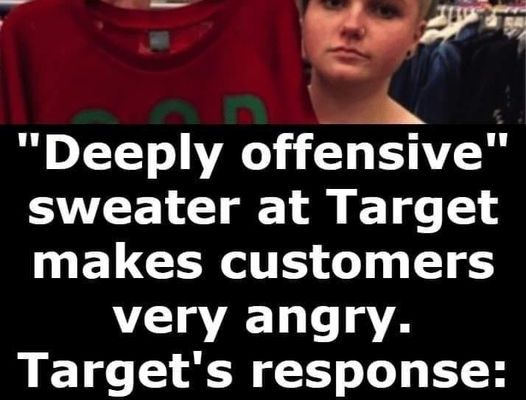People dealing with certain conditions or disorders may find it easy to be offended by items that seem to make light of their experiences. While these feelings can be valid, they can sometimes be perceived as exaggerated.
A young woman named Reign Murphy, who frequently shops at Target, was taken aback by a sweater she found in the store. While browsing, she spotted a red, green, and white sweater that caught her eye, but her shock grew when she saw the “insensitive” words printed on the front.

The sweater read “OCD Obsessive Christmas Disorder.”
Reign, who was diagnosed with actual OCD, felt deeply offended by the phrase. She snapped a photo of the sweater and publicly criticized the retailer for what she viewed as mocking those with a psychological disorder.
She tweeted the photo, which quickly went viral, amassing over a thousand retweets. Her tweet stated, “I’d really appreciate it if you didn’t sell my mental illness as a fashion statement.”

Although the phrase has been used by various designers to describe individuals who love Christmas and might go overboard, many internet users expressed outrage, while others felt the message was not offensive, even if they personally dealt with the disorder.
Some social media users criticized the major retailer, saying it was inappropriate to make light of mental health issues. Comments included, “I am annoyed we still live in a world where making fun of mental health is okay,” and “Why is trivializing a mental disorder so widely accepted?”

However, some users who identified as having OCD defended the sweater and felt the backlash was unwarranted. One user wrote, “As someone with OCD, Target’s OCD sweater doesn’t offend me at all.” Another added, “I don’t see any reason to be angry about Target’s ‘offensive’ sweater—it’s perfectly fine!”
In response to the backlash, Jessica Carlson, a spokesperson for Target, apologized to those who were offended but clarified that the store had no plans to remove the item from its shelves. “We currently do not have plans to remove this sweater,” Carlson stated.
According to the Anxiety and Depression Association of America, approximately 2.5 million people, or 1.2% of the U.S. population, suffer from OCD.
In 2015, Target faced controversy when a woman claimed that some of their women’s T-shirts featuring the word “Trophy” were insulting, arguing that they perpetuated the idea that women could be bought or sold.
Watch the video below and share your thoughts on this story!



